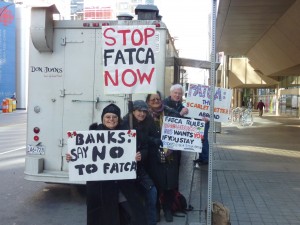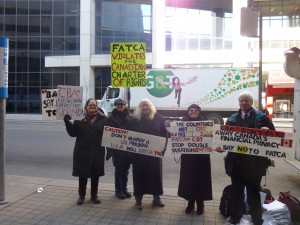photo from yesterday, day 1 of protest
PROTEST EVENING POSTMORTEM:
I know that this small protest did reach the FIsters attending the conference and put them on notice–because most refused to look us in the eye.
This protest happened because of the dedication of on-site protesters including Atticus, Marie, Northernstar, Peter, Tricia, and WhiteKat, those (including Blaze and James Jatras) who helped in preparation of the letter to the Canadian Bankers Association that was critical to the protest, and because of the others I am not certain that I can mention.
Amazing people, all.
On-site coverage from IRSCompliantForever :
15.54. A last goodbye from all of us to the banksters.
15:03. Banker from small bank who hates FATCA just signed petition.
14:24. AttIcus just explained FATCA to passerby. Response was “Well, the banks need a little (words deleted).”
14:14. Banksters we meet all express sympathy but insist that there is no way to prevent FATCA. So many passerbys wondering about this FATCA word.
13:18. Fellow from one of the major banks visited with us had a friendly chat and accepted the CBA letter. He asked that we not disclose the name of his bank. Banksters are also taking pictures of us.
12.55. Another passerby came up to us expressing concern that her daughter has a Green Card.
Reports and photos of earlier today and yesterday after the jump
12:53. A passerby just came up to us expressing concern that she was born to a US parent and asked whether FATCA applied. Atticus explained and the woman thanked us for being here.
11:23. Unexpectedly another protester arrived with signs. Someone we all know.
11:13. Police have arrived again.
10:51. Nice sunny day. One bankster inside gave us the thumbs up. We had a nice chat with two reps of a major FI who accepted the CBA letter.
***
Day 1 of Protest – Yesterday, 13 November
13:40. Stuck on a narrow curb.
13:07. New development. Head of security informed us that we had to move to the curb in which we must remain 18 inches from the street. I called the police to resolve. Three police officers came and tried to intervene with security, but security refused as walkway is technically on private property. Want to emphasize that police tried their very best to help us. We will try not to tip over on curb. Lots of interest from passerbys. Morale very high.
12:50
12:46
12:13. Above is a photo of four Brocker/Sandboxers taken by a sympathetic passerby. Note that the person holding the “Do not marry an American” sign is a guest Brocker who is a kindly non-US spouse of a US person. She strongly supports the message of the sign and wants to be known as @LauraSecord. Small group but morale is high.
11:09. Met a fellow working for a bank. He says FATCA is painful.
11:02. Tricia, Marie, NorthernStar and IRSCompliantForever just spoke to a very friendly and receptive journalist who will include mention of our protest in an article He also said that this is the first FATCA protest he is aware of. We cannot mention name of journalist. We are pointing signs at the conference room. Doors are closed now so that banksters cannot see us.
09:37. Peter is standing immediately in front of the conference meeting room. We can see them and they can see us. But we cannot enter.
07:33. Peter and I are on site. We were told us that we would be arrested if we entered building. Tried to leave CBA letters but conference organizer refused and noted that our comments on IBS about CBA were inflammatory.
***
The conference is “Canadian Institute’s 19th Annual REGULATORY COMPLIANCE for Financial Institutions” at the North Building of the Metro Convention Centre in Toronto which has been brought to our attention through the diligence of @Tricia. http://www.regulatorycomplianceforfis.com/












@Em
((()))) 🙂
Here is what I think J.E. Gutierrez is trying to say…
Cartoon: The TPP explained
Just change the caption for Canada…
The Canadian FATCA IGA explained
Quote bubble: “By June 2014, Canadian Bankers will be able to jump through this hoop!”
🙂
@Mark Twain
You are making a very intriguing suggestion but I am struggling to understand how it would somehow skip through FATCA’s pass-through rules.
Even if the non-US subsidiary in your model had no direct US investment, it would still be prevented from doing business with any FATCA participant institution (or if it did, it would be subject to the 30% withholding).
Again, since the overwhelming majority of the world’s financial institutions will be FATCA compliant now that all major banking and financial centers have signed up, this will leave your non-US subsidiary completely isolated.
Please let me know I am getting the analysis wrong. Thank you.
Although we have heard a bit from the participants in the Nov 13 & 14 protest, I hope there will be some more reports to come. Each event is an experience we can build on for the next one.
I know we are all tired of commenting on articles which pop up here and there but I hope we can catch a collective second breath and continue to challenge the misconceptions which are still being played out in the media. There has been some improvement in the accuracy of the information being put out lately but whenever an article or commenter is trying to give the impression that FATCA is good medicine and not the poison we know it to be, we can use our own comments to provide an antidote.
I would still like to see a sidebar where people could post an article link, a very brief explanation of what it is about and whether or not comments are possible or needed. (Save discussions for other threads.) That way we can quickly pick our targets without having to locate them in the Brock fog. We don’t need to convince each other of the unfairness of CBT and the tyranny of FATCA; we need to convince others. So keep on rocking the FATCAphiles’ boat, Brockers. That’s a ship that deserves to be sunk.
@J.E. Gutierrez, so far, all evidence suggests that FATCA has failed. Only 10 nations got fooled into signing IGA’s, most banks are not FATCA-ready.
Here’s a question for you. Why is the US utterly horrified of reporting the finances of illegal aliens living in the US to the Mexican tax authorities? The US-Mexican IGA specifically states that the United States unconditionally opposes financial transparency. Is this what FATCA is all about?
@Em
We are planning a separate post with comments from each of those who participated in the protest. I will post when all are received.
Thanks!
Mr. Gutierrez: Oh well, I guess I’m wrong. You can’t do it. Only a Group of competitors can do it. You’re organization can’t.
Competitive business doesn’t pop up while you are expecting it—it pops up while you are sleeping.
Good luck.
@SwissPinoy
I am not knowledgeable enough to comment about the disclosure and reporting requirements for undocumented Mexican residents in the United States. But how is it connected with IBA’s protest against Canadian banks?
On the issue of the IGAs, it definitely looks like the United States are finding it challenging to conclude a significant number of them in timely manner. However, one must accept that all the major financial centers have now signed up: all of Europe (especially the UK, Germany and France), Japan, Switzerland, Israel, etc. Hong Kong and Singapore are also getting there. All UK territories in Europe and the Caribbean have agreed to implement the law.
Someone with spare time should add the exact numbers, but I assume that about 80-90% of the world’s banking markets are by now covered by IGAs.
If your analysis is different, it would be very interesting to read it. Thank you.
@J.E. Gutierrez, read the US-Mexican IGA. It only takes a few minutes to read there that the US opposes transparency and doesn’t want to crack down on the money laundering of illegals living in the US.
@ J.E.G.
Here are the signees, so far, according to the Treasury Dept. website:
Model 1 IGA
* Denmark (11-19-2012)
* France (11-14-2013)
* Germany (5-31-2013)
* Ireland (1-23-2013)
* Mexico (11-19-2012)
* Norway (4-15-2013)
* Spain (5-14-2013)
* United Kingdom (9-12-2012)
Model 2 IGA
* Japan (6-11-2013)
* Switzerland (2-14-2013)
Doesn’t look like 80-90% to me. If an FI in a country complies with FATCA on its own, without that country having signed an IGA, I would imagine it would be breaking that country’s banking privacy laws but then maybe there are only a few countries in the world, like Canada, that even have such laws. I really don’t know. I won’t speculate on who is about to sign because I doubt even the Treasury Dept. knows for certain.
@SwissPinoy
I shall read it if I can find it.
I have generally a great deal of sympathy for undocumented immigrants (I dislike the word illegal), wherever they live. They are very often taken advantage of by unscrupulous employers and service providers because they cannot rely on the government for protection.
In the case of Mexico (and other Latin countries), there is I believe huge concern that if the financial data of Mexican nationals living in the US (or elesewhere, including Canada) were passed to Mexico, corrupt officials there could use them to blackmail relatives living in Mexico, or even commit much worse crimes like kidnapping for ransom.
This is an interesting conversation to have, but again, I am not sure why it came up on a thread dedicated to the application of FATCA by Canadian banks.
@Em
The United States alone are around 50% of the world’s banking and capital markets, largely because of the US Dollar’s role as reserve currency and the dominance of US banks in world financial services. Add the UK and Japan, because of London’s and Tokyo’s leadership as financial centers. Whichever definition one uses, that represents a very large share of the world’s banking markets, certainly close to 80% in my opinion.
@ J.E.G.
Well there you go. The U.S.A. should just be happy with it’s 80% control and leave the other 20% alone. This “full spectral domination” meme is wearing thin.
@J.E. Gutierrez, you can also read the same in the French-US IGA. America is utterly horrified that if it is transparent on the financials of French citizens living in the US, that then it would cause significant damage to money laundering. Such would destroy America’s favored role as being the world’s largest and most secret tax haven!
@JEG
I guess the US has full confidence that it will control the world banks as it does have over 700 military bases around the world. It can force countries if necessary or drone them.
Let’s face it. While we are angry and outraged with FATCA, it is not so much FATCA we should be angry with. Ultimately, it is CBT, and how the IRS/US government defines citizens and “US persons”. We care not a bit how the US taxes it’s residents or true resident tax evaders, they choose to be residents.
That we, outside the US, have no representation in the US says it all.
@ J.E. Gutierrez, et al,
Financial markets and FATCA-watchers should be aware of another possible US government disruption in the pipeline. During the recent October 2013 government shutdown, FATCA IGA negotiations and many other Treasury functions were curtailed.
The bi-partisan agreement to re-open the US government has a short lifespan. It funds the government through January 15 at sequestration levels and suspends the debt limit until February 7. It does not reduce the current $17 Trillion deficit, nor does it resolve Obamacare and the other highly divisive issues that led to the shutdown.
During the October shutdown Treasury was unable to sign a FATCA IGA with France: a one-sided deal that France was fecklessly willing to sign at the time (it was actually signed last week, but don’t know what France’s required next steps to internally ratify are).
Well, with the implementation of these IGA’s then, I guess the objective is to make it 100%. Perhaps they’ll be able to simply eliminate Canadian currency altogether. That certainly would make it easier for the Canadian banks to handle compliancy.
@ J.E. Gutierrez, I have no issue with Mexican citizens living in the US. My interest is fair share and tax justice. As we know, the purpose of citizenship-based taxation is to ensure that people cannot move to gain a tax advantage. CBT requires that an individual pays the difference in taxes of what they would otherwise save.
Now, 11 million Mexican citizens moved to American in order to work without paying any taxes. Since they don’t pay any US taxes, the concept of CBT requires that they pay taxes to the Mexican government. Knowing that it is difficult for the Mexican government to collect its fair share of taxes in the US tax haven, the United States created FATCA to enable banks to assist the Mexican government in collecting taxes from individuals working in the United States who are not paying their fair share, along the rules of CBT and anti-money laundering efforts.
Yet, somehow, the US wrote the Mexican-US IGA in such a manner that it would continue to allow Mexican citizens working in the US to continue not pay their fair share of taxes, since it refuses to allow banks to report Mexican citizens to the Mexican tax authorities.
What is your reasoning for this? Has the America become a more corrupt and abusive fair-share-hating tax haven which honors the money laundering of Mexican tax cheats?
I agree with JEG from the point of view that it is the Canadian Government that should be the primary target of protests and actions regarding the possible IGA or allowing any enforcement of FATCA within Canada. However, it seems to me that the CBA and the Canadian Banks, while initially having put up some arguably token opposition to FATCA, are now switching to becoming enablers. In as much as it involves the violation of Canadians’ rights and imposes costs on their stakeholders, from a potential victim’s point of view, I also believe they should be made to feel some heat from the public for being enablers who have lobbied the Government to sacrifice people’s rights for commercial interests. But I reiterate, it is indeed the Government’s primary responsibility to protect those rights not the CBA’s. I also reiterate that I think opponents should not shy away from opening campaigns on all fronts, including the CBA.
As for the 30% withholding being ‘life threatening’ for Canadian FIs, I believe the jury is definitely out on that one. I personally believe that if the US made good on that threat on any reasonable scale, they would provoke another global financial crisis or certainly a crisis in their own capital markets. It is often said that ‘Fear and Greed’ are the dominant motivators in the markets. I believe FEAR is even bigger than GREED. Markets seem to go down faster than they go up. I think that 30% is something they want to avoid at all costs because it will bite them very hard.
I am not sure of the relevance of JEG’s point about places like London or Tokyo (being major financial markets) having already signed up. Sure London is a major financial centre, but I don’t think there are significant US persons affected there, although certainly more than Tokyo where there is likely almost none. Also, most international FIs in London will have few personal depositors and virtually no US depositors of significance. So the British agreement to an IGA really, in substance only affects British FIs in my view. From that perspective. Toronto is much more important than London or Tokyo or Hong Kong from a FATCA perspective. Finally, while there might be some noise that Hong Kong is getting ready to join the FATCA parade, I wonder if Beijing starts to view it as a Foreign Policy issue what will happen then. As I understand it, the Special Administrative Region (SAR) of Hong Kong does not exercise any authority over Foreign Policy.
The CBA also believes it’s the Canadian government’s duty to protect their interests, and are advocating for an IGA. It’s our duty to attack those who lobby the government for an IGA, just as it’s open season on on us by anyone group or entity that supports FATCA. Protesting the CBA is just part of a multi-pronged approach to defeating FATCA.
As one attendee who came out of that bankers meeting said to me “We don’t want this either.” He seemed sympathetic. So I replied to him “Yes but, an IGA will protect you while throwing us under the bus. You get protection, we get sold out.”
So the age old chant “Banks got bailed out, we got sold out” is coming true here in Canada as well.
You know a banking relationship is a matter of trust and though an IGA will protect the banks to a larger degree it will also show that they are not to be trusted on matters of a customers privacy here in Canada.
I could tell most everyone who spoke to us thought this was an awful law, they feel powerless to stop it yet going along with an IGA DOES give them a lot more protection while selling us all out. That’s the bottom line no matter how much they think this is a bad law, no matter how much they feel for us. We’re the ones under the proverbial bus. Banks have a safety net, we do not. I could hardly look at those who said they felt for us. Inviting a ridiculous American here to talk about “navigating the hurdles of FATCA” meant only one thing to me. Navigating the laws of Canada and our Charter in order to violate those laws with impunity. A sad day for all. Especially gathering advise from an outsider, not even a citizen of this country on how to proceed with this heinous U.S. over reach. The fall out is only innocent Canadian families. Where is our seat at these discussions and meetings?
@Atticusincanada, well, based on what has been going on in Switzerland, it will only get worse for the banks and they are fooling themselves by thinking that it will get better.
This might be the beginning of the end of nationality. With nations being so eager to throw their own citizens under the bus, the whole concept of nationality is being destroyed. Nobody will care to be a citizen of a nation which does not protect its people.
@Only a Canadian
I think your observations are excellent. Maybe I could add a couple of things.
The importance of Tokyo and, especially London is not a function of the number of US persons affected by FATCA in either location. It is rather because so many global banks are headquartered there (depending on how you measure size, up to 40-50% of the 20 largest banks in the world), and because in the case of London, so many international banks have incorporated local subsidiaries to act as broker-dealers in the Eurobonds, -credit and foreign exchange markets.
As I understand it, under the IGAS these entities will be subject to FATCA, and will have to apply the pass-through rules towards non-participating institutions, effectively making any further business impossible.
I share your view regarding the great reluctance of the United States to actually ever enforce the 30% withholding, and the significant damage this course of action could inflict on US capital markets. I believe that it is far more likely that the United States would proceed incrementally, by initially targeting one or a small group of systemically non-critical non-participating institutions to ‘make an example’ without risking any serious consequences for their own capital markets.
I made the point earlier in this thread that the risk alone of withholding would have disastrous consequences for non-participating banks. How would depositors respond if their bank found itself under the threat of seeing 30% instantaneously confiscated? How would rating agencies factor this increased, largely binary risk? Would wholesale creditors or the participants in the repo markets accept exposure to a bank carrying this type of risk? I personally doubt it, but will concede that it is a matter of judgement.
I would be very interested to read your thoughts about this.